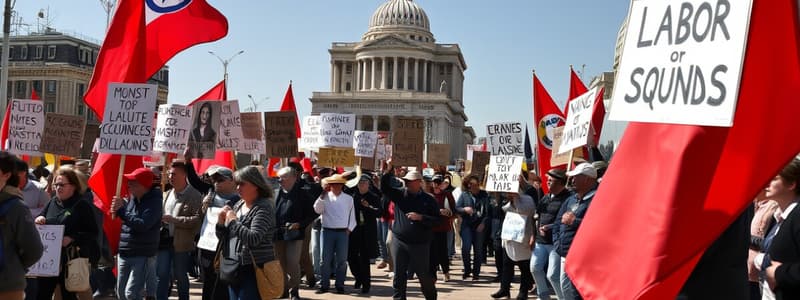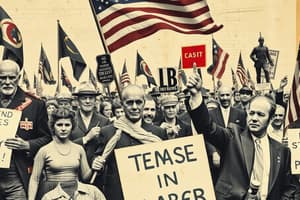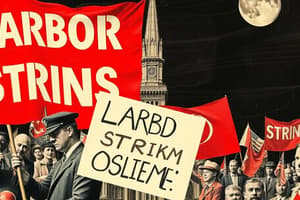Podcast
Questions and Answers
What significant event is associated with the Great Railroad Strike of 1877?
What significant event is associated with the Great Railroad Strike of 1877?
- Establishment of the gold standard
- Formation of a new union
- The introduction of assembly lines
- The financial bubble burst (correct)
What is Scientific Management?
What is Scientific Management?
The introduction of industrialism, assembly lines, mass production.
Who is Cyrus McCormick?
Who is Cyrus McCormick?
A businessman who utilized mass production and production managers with his reapers.
What does the term 'Visible Hand' refer to?
What does the term 'Visible Hand' refer to?
What was J.P. Morgan known for?
What was J.P. Morgan known for?
Who is Henry George?
Who is Henry George?
What is a 'robber baron'?
What is a 'robber baron'?
Who was Cornelius Vanderbilt?
Who was Cornelius Vanderbilt?
Who is John D. Rockefeller?
Who is John D. Rockefeller?
What was Andrew Carnegie known for?
What was Andrew Carnegie known for?
What is Social Darwinism?
What is Social Darwinism?
Who was William Graham Sumner?
Who was William Graham Sumner?
What was the Knights of Labor?
What was the Knights of Labor?
What was the Haymarket Riot?
What was the Haymarket Riot?
What is the American Federation of Labor?
What is the American Federation of Labor?
What happened during the Homestead Strike of 1892?
What happened during the Homestead Strike of 1892?
What was the Pullman Strike of 1894 about?
What was the Pullman Strike of 1894 about?
Who was Eugene Victor Debs?
Who was Eugene Victor Debs?
What was the Farmer's Alliance?
What was the Farmer's Alliance?
What did the Populist Party spring from?
What did the Populist Party spring from?
What was the Omaha Platform of 1892?
What was the Omaha Platform of 1892?
What was the Panic of 1893?
What was the Panic of 1893?
What is 'Free Silver'?
What is 'Free Silver'?
Who was William Jennings Bryan?
Who was William Jennings Bryan?
Who won the presidential election of 1896?
Who won the presidential election of 1896?
What was the Socialist Party of America known for?
What was the Socialist Party of America known for?
Flashcards are hidden until you start studying
Study Notes
Labor Strikes and Movements
- The Great Railroad Strike of 1877 marked a significant labor uprising, stemming from the railroad financial crisis, affecting cities from Baltimore to St. Louis.
- The Knights of Labor was an inclusive union allowing both skilled and unskilled workers, including women, aiming for broad labor reforms.
- Heightened labor tensions led to pivotal events like the Haymarket Riot, where a bomb explosion resulted in the deaths of seven policemen.
- The Homestead Strike of 1892 involved workers who occupied Andrew Carnegie's steel mill to protest harsh working conditions.
- The Pullman Strike in 1894 arose when workers protested wage cuts while living costs remained unchanged.
Economic Theories and Practices
- Scientific Management introduced efficiency in factories through assembly lines and mass production techniques.
- Social Darwinism suggested that economic success was a marker of superiority, leading to a belief that assistance to the weak would weaken society.
- Notable economist Henry George authored "Progress and Poverty" in 1879, analyzing the interplay of wealth and inequality.
Key Figures in Industry
- Cyrus McCormick revolutionized agriculture by applying mass production to his reapers, leading to significant profit increases.
- J.P. Morgan was crucial in forming the United States Steel Corporation, a notable early monopoly combining eight companies.
- Cornelius Vanderbilt built immense wealth through railroads and shipping, becoming a prominent business tycoon.
- John D. Rockefeller dominated the oil industry, establishing a massive industrial and philanthropic legacy.
- Andrew Carnegie spearheaded the expansion of the American steel industry, greatly influencing industrial growth.
Labor Organizations
- The American Federation of Labor emerged after the Haymarket Riot, positioning itself as a more conservative alternative to the Knights of Labor.
- Eugene Victor Debs, a key labor leader and Socialist Party candidate, played a vital role in advocating for workers' rights through union activities.
Political Movements
- The Populist Party originated from the Farmer's Alliance, emphasizing reforms to support farmers and challenge the capitalist system.
- The Omaha Platform of 1892 called for increased federal control, including nationalizing railroads and expanded government loans to alleviate economic struggles.
- The Panic of 1893 triggered a severe economic depression, escalating the need for reform and alternative political solutions.
Monetary Policies
- The Free Silver movement advocated for the coinage of silver to counter the gold standard, aiming to increase money supply and aid economic recovery.
- William Jennings Bryan secured the 1896 Democratic presidential nomination as well as support from the Populist Party, representing a pivotal force in advocating for monetary reform.
- William McKinley won the 1896 election, enforcing the gold standard, which had significant implications for the economy and future monetary policy.
Cultural Terms
- "Robber baron" referred to wealthy industrialists like Rockefeller and Carnegie, often criticized for their monopolistic practices and exploitation of workers.
- The "Visible Hand" concept described the emerging managerial class facilitating communication and responsibility between workers and owners in growing industries.
- William Graham Sumner championed the notion that helping the weak was detrimental to societal progress, aligning with Social Darwinist beliefs.
Studying That Suits You
Use AI to generate personalized quizzes and flashcards to suit your learning preferences.




